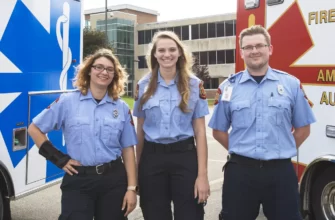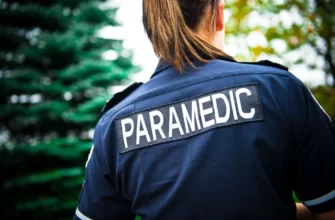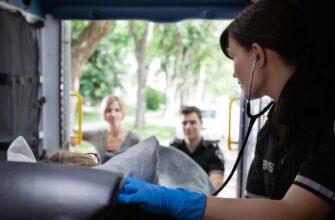Welcome to EMTtrainingusa, your trusted source for comprehensive resources and guidance in the world of Emergency Medical Services (EMS). While our focus is primarily on providing top-notch training for EMTs, we recognize the immense emotional challenges that come with the job. The demanding nature of responding to emergencies and witnessing human suffering firsthand can take a significant toll on mental health. That’s why we’ve curated this exclusive list of the top 10 EMT Mental Health Resources, tailored specifically to help EMTs cope with the emotional rigors of their profession. Join us as we explore these invaluable resources designed to support the well-being of our frontline heroes, ensuring they have the tools and support they need to thrive both professionally and personally. Let’s prioritize mental wellness and resilience as we continue our commitment to serving our communities with compassion and dedication.
| Mental Health Resource | Description |
| Crisis Hotlines | Confidential hotlines available 24/7 to provide immediate support and assistance. |
| Peer Support Programs | Programs connecting EMTs with trained peers who understand the unique challenges of the profession. |
| Training Courses | Courses focused on stress management, coping strategies, and mental wellness for EMTs. |
| Online Self-Help Tools | Interactive modules, mindfulness exercises, and educational resources accessible online. |
| Support Groups | Groups where EMTs can connect, share experiences, and receive support from their peers. |
| Counseling Services | Professional counseling services offering confidential support and guidance for EMTs. |
| Mindfulness and Meditation | Exercises and practices to promote relaxation, stress reduction, and emotional balance. |
| Educational Materials | Resources providing insights into mental health conditions, treatment options, and self-care practices. |
| Crisis Intervention Programs | Programs offering immediate support and intervention during and after critical incidents. |
| Workplace Wellness Programs | Initiatives within EMS agencies promoting mental wellness, resilience, and work-life balance. |
Code green campaign
In the high-stakes world of emergency response, where split-second decisions can mean the difference between life and death, the mental well-being of first responders often takes a backseat. However, the Code Green Campaign is changing that narrative by shining a spotlight on the crucial issue of mental health within the EMS community.

Founded with the mission to address mental health challenges among first responders, including EMTs, the Code Green Campaign provides a lifeline of support, resources, and education. At its core, the campaign acknowledges that the emotional toll of the job can be just as profound as the physical demands.
- One of the most valuable aspects of the Code Green Campaign is its multifaceted approach to support. Through their website, they offer a wealth of resources ranging from informative articles to interactive forums where first responders can connect with others facing similar challenges. These forums serve as safe spaces for individuals to share their experiences, seek advice, and offer support to one another, fostering a sense of community and camaraderie.
- Moreover, the Code Green Campaign recognizes the importance of localized support. Their website provides information on local support groups, ensuring that first responders have access to resources tailored to their specific communities. This emphasis on local connections reinforces the idea that no one has to face mental health struggles alone.
- In addition to providing support and resources, the Code Green Campaign places a strong emphasis on education. They offer training programs and workshops designed to raise awareness about mental health issues within the EMS community and provide strategies for coping with stress, trauma, and burnout. By equipping first responders with knowledge and tools to prioritize their mental well-being, the campaign aims to create a culture of openness and resilience within the EMS profession.
Overall, the Code Green Campaign is a beacon of hope for first responders navigating the complex terrain of mental health. By providing resources, support, and education, they are breaking down barriers and fostering a culture of compassion and understanding within the EMS community. As we continue to recognize the importance of mental health in all aspects of life, initiatives like the Code Green Campaign serve as a reminder that no one should suffer in silence, especially those who dedicate their lives to saving others.
The first responder center for excellence (FRCE)
In the high-stress world of emergency response, the mental health of first responders, including EMTs, is often overlooked. However, organizations like the First Responder Center for Excellence (FRCE) are changing the narrative by prioritizing mental wellness and providing invaluable resources and training tailored to the unique needs of those on the front lines.

- FRCE stands as a beacon of support for first responders, offering a comprehensive array of resources and training programs aimed at addressing the mental health challenges inherent in their line of work. At the heart of their mission is a commitment to promoting mental wellness and resilience among those who dedicate their lives to saving others.
- One of the key features of FRCE is its robust online platform, which serves as a central hub for resources and information related to mental health in the first responder community. Through their website, first responders have access to a wealth of research, toolkits, and training programs specifically designed to address the unique stressors and trauma experienced in the field.
- From informative articles and research papers to practical toolkits and self-assessment resources, FRCE’s online platform offers a wealth of knowledge and support at the fingertips of first responders. Whether seeking guidance on coping strategies, stress management techniques, or accessing mental health services, individuals can find valuable resources to support their mental well-being.
- Moreover, FRCE’s commitment to education and training is evident in their diverse array of programs aimed at equipping first responders with the tools and knowledge to prioritize their mental health. From interactive workshops and webinars to in-depth training courses, FRCE offers opportunities for professional development and personal growth in the realm of mental wellness.
- By empowering first responders with the skills and resources they need to prioritize their mental health, FRCE is playing a pivotal role in fostering a culture of resilience and support within the emergency response community. Through their tireless efforts, they are breaking down barriers and challenging the stigma surrounding mental health, ensuring that those on the front lines receive the care and support they deserve.
In conclusion, the First Responder Center for Excellence (FRCE) stands as a beacon of hope and support for first responders, including EMTs, navigating the complexities of mental health in their line of work. Through their dedication to providing resources, training, and support, FRCE is making a tangible difference in the lives of those who dedicate their lives to serving others. As we continue to recognize the importance of mental wellness in all aspects of life, organizations like FRCE serve as a reminder that support and resources are available for those who need them most.
Safe call now
In the fast-paced and high-pressure world of emergency response, the toll on mental health can often be profound. Yet, amidst the chaos and adrenaline rushes, the emotional well-being of first responders, including EMTs, can easily be overlooked. Recognizing this critical need for support, Safe Call Now stands as a beacon of hope and assistance, offering a lifeline for those struggling with mental health issues in the first responder community.

At its core, Safe Call Now is a crisis hotline specifically tailored to the unique needs of first responders, including EMTs, who find themselves grappling with mental health challenges. Available 24/7, this confidential hotline provides a safe and supportive space for individuals to seek help and guidance whenever they need it most.
- What sets Safe Call Now apart is its emphasis on peer support. Callers are connected with trained peer support specialists who possess firsthand experience and understanding of the unique challenges faced by EMTs and other first responders. This peer-to-peer connection fosters a sense of trust and empathy, creating an environment where individuals feel understood and supported in their journey towards healing.
- The importance of confidentiality cannot be overstated when it comes to seeking help for mental health issues, particularly for those working in high-stakes professions like emergency response. Safe Call Now prioritizes confidentiality, ensuring that callers can reach out for support without fear of judgment or repercussion. This commitment to confidentiality is essential in breaking down barriers to seeking help and encouraging individuals to take the first step towards healing.
- In addition to providing immediate crisis intervention and support, Safe Call Now also offers assistance in connecting callers with additional resources and services as needed. Whether it’s accessing mental health treatment, finding support groups, or navigating workplace challenges, Safe Call Now is dedicated to ensuring that individuals receive the comprehensive support they need to thrive.
- Furthermore, Safe Call Now recognizes the importance of proactive outreach and education in promoting mental wellness within the first responder community. Through their outreach efforts and educational initiatives, they aim to raise awareness about mental health issues and reduce the stigma surrounding seeking help. By empowering individuals with knowledge and resources, Safe Call Now is working towards creating a culture of openness and support within the first responder community.
In conclusion, Safe Call Now serves as a vital lifeline for first responders, including EMTs, who find themselves struggling with mental health issues. Through their confidential hotline, peer support model, and commitment to education and outreach, Safe Call Now is making a tangible difference in the lives of those who dedicate their lives to serving others. As we continue to recognize the importance of prioritizing mental wellness in all aspects of life, initiatives like Safe Call Now serve as a reminder that help and support are always just a phone call away.
National suicide prevention lifeline
In the realm of emergency response, where the weight of responsibility and the burden of trauma can often feel overwhelming, the importance of mental health support cannot be overstated. While the challenges faced by first responders, including EMTs, are unique, the National Suicide Prevention Lifeline stands as a beacon of hope and support for anyone experiencing distress, including those on the front lines of emergency response.

- Although the National Suicide Prevention Lifeline is not specifically tailored to the needs of EMTs, its mission to provide free and confidential support to individuals in crisis extends to all members of the first responder community. Trained counselors are available 24/7 to offer compassionate support, active listening, and practical guidance to anyone in need, regardless of their profession or background.
- What sets the National Suicide Prevention Lifeline apart is its commitment to providing immediate support and connection to local resources. In times of crisis, first responders may feel isolated or unsure of where to turn for help. The lifeline serves as a lifeline, offering a compassionate ear and a roadmap to additional support services, including mental health treatment, support groups, and crisis intervention resources.
- Moreover, the National Suicide Prevention Lifeline operates with the understanding that mental health struggles can affect anyone, regardless of their outward appearance or perceived strength. For first responders who may be accustomed to being the ones providing aid and support to others, reaching out for help can feel like a daunting task. However, the lifeline offers a non-judgmental space where individuals can safely express their emotions and receive the support they need without fear of stigma or discrimination.
- In addition to providing immediate crisis intervention, the National Suicide Prevention Lifeline also plays a vital role in suicide prevention through its outreach and education efforts. By raising awareness about the warning signs of suicide and providing resources for prevention and intervention, the lifeline aims to reduce the incidence of suicide and save lives.
While the challenges faced by first responders may be unique, the National Suicide Prevention Lifeline stands as a beacon of hope and support for anyone experiencing distress, including those on the front lines of emergency response. Through its compassionate counselors, immediate support services, and commitment to suicide prevention, the lifeline offers a lifeline of hope to those in their darkest moments. As we continue to prioritize mental wellness and support within the first responder community, initiatives like the National Suicide Prevention Lifeline serve as a reminder that help and hope are always available to those in need.
The code 9 project
In the realm of emergency medical services, the toll of the job extends far beyond the physical demands of saving lives. For EMTs, the daily exposure to trauma, violence, and human suffering can leave lasting scars on their mental health. Recognizing the urgent need to address these issues, the Code 9 Project emerges as a beacon of hope and support for EMTs grappling with PTSD and other mental health challenges.

At its core, the Code 9 Project is dedicated to raising awareness about PTSD and mental health issues within the first responder community, with a specific focus on EMTs. By shedding light on the unique challenges faced by EMTs in their line of work, the project aims to break down stigma, foster understanding, and promote proactive measures for mental wellness.
One of the most valuable resources offered by the Code 9 Project is its educational materials. Through workshops, seminars, and online resources, EMTs have access to comprehensive information about PTSD, its symptoms, and strategies for coping and recovery. By empowering EMTs with knowledge and awareness, the project equips them with the tools they need to recognize and address their own mental health needs.
- Furthermore, the Code 9 Project provides a vital lifeline of support through its peer support network. EMTs can connect with others who have walked in their shoes, sharing experiences, offering encouragement, and providing a listening ear to those in need. This peer-to-peer support fosters a sense of camaraderie and understanding, creating a safe space for EMTs to seek help and support without fear of judgment.
- In addition to peer support, the Code 9 Project facilitates access to mental health professionals who specialize in working with first responders. These professionals possess a deep understanding of the unique challenges faced by EMTs and are equipped to provide tailored support and treatment options. Whether through individual counseling, group therapy, or specialized programs, EMTs can find the help they need to heal and thrive.
- What sets the Code 9 Project apart is its commitment to action and advocacy. By amplifying the voices of EMTs and advocating for systemic change within the industry, the project aims to create a culture of support and understanding surrounding mental health issues. Through partnerships with industry stakeholders, policymakers, and advocacy groups, the Code 9 Project works tirelessly to ensure that EMTs receive the support and resources they need to confront PTSD and mental health challenges head-on.
In conclusion, the Code 9 Project stands as a beacon of hope and support for EMTs struggling with PTSD and mental health issues. Through its educational resources, peer support network, and access to mental health professionals, the project empowers EMTs to confront their challenges, seek help, and embark on a journey of healing and recovery. As we continue to recognize the importance of prioritizing mental wellness within the first responder community, initiatives like the Code 9 Project serve as a reminder that help and support are available to those who need it most.
Share the load program (IAFF)
In the world of emergency response, the toll on mental health can be just as profound as the physical demands of the job. Recognizing this critical need for support, the International Association of Fire Fighters (IAFF) launched the Share the Load Program, a lifeline for first responders, including EMTs, who find themselves grappling with mental health issues.

- At its core, the Share the Load Program offers confidential assistance to first responders struggling with mental health challenges. Through a network of trained professionals and resources, the program provides a safe space for individuals to seek help, guidance, and support without fear of judgment or repercussion.
- One of the most valuable services offered by the Share the Load Program is counseling. Trained counselors are available to provide confidential support and guidance to first responders facing mental health challenges. Whether dealing with stress, trauma, depression, or anxiety, individuals can access professional counseling services to help them navigate their struggles and find a path towards healing.
- In addition to professional counseling, the Share the Load Program also offers peer support. Through peer support groups and networks, first responders can connect with others who understand the unique challenges they face. These peer-to-peer connections foster a sense of camaraderie, understanding, and solidarity, creating a supportive community where individuals can share their experiences and support one another on their journey towards mental wellness.
- Moreover, the Share the Load Program provides access to treatment resources for first responders in need of specialized care. Whether seeking inpatient treatment, outpatient therapy, or specialized programs for PTSD and other mental health conditions, individuals can find the help they need to address their mental health challenges and reclaim their well-being.
- What sets the Share the Load Program apart is its commitment to confidentiality and privacy. Recognizing the stigma surrounding mental health in the first responder community, the program ensures that individuals can seek help without fear of their struggles being disclosed to others. This confidentiality is essential in breaking down barriers to seeking help and encouraging individuals to take the first step towards healing.
In conclusion, the Share the Load Program stands as a beacon of hope and support for first responders, including EMTs, grappling with mental health issues. Through its confidential counseling services, peer support networks, and access to treatment resources, the program empowers individuals to confront their struggles, seek help, and embark on a journey of healing and recovery. As we continue to prioritize mental wellness within the first responder community, initiatives like the Share the Load Program serve as a reminder that help and support are available to those who need it most.
Mental health first aid (MHFA)
In the fast-paced world of emergency medical services (EMS), the importance of mental health cannot be overstated. From high-stress situations to witnessing traumatic events, EMTs face unique challenges that can take a toll on their mental well-being. Recognizing the need for proactive support, Mental Health First Aid (MHFA) emerges as a crucial resource, offering training programs designed to equip EMTs with the tools and knowledge to recognize and respond to signs of mental health and substance use challenges.

At its core, MHFA training programs are designed to provide individuals with the skills and confidence to identify, understand, and respond to mental health and substance use challenges in their communities. Through a combination of interactive lectures, group discussions, and hands-on activities, participants learn how to recognize common signs and symptoms of mental health issues, offer initial support, and guide individuals towards appropriate professional help.
- One of the most significant benefits of MHFA training for EMTs is the ability to better support their colleagues and themselves in times of need. As frontline responders, EMTs often witness and experience traumatic events that can impact their mental well-being. MHFA training equips EMTs with the knowledge and tools to recognize signs of distress in themselves and their colleagues, offer support and assistance, and connect them with appropriate resources for further help if needed.
- Moreover, MHFA training helps EMTs develop a deeper understanding of mental health conditions and reduce stigma surrounding mental illness. By promoting open and honest conversations about mental health, MHFA training fosters a supportive culture where individuals feel comfortable seeking help and support when needed. This proactive approach not only benefits individual EMTs but also contributes to a healthier and more resilient EMS workforce as a whole.
- Additionally, MHFA training emphasizes the importance of self-care and resilience-building strategies for EMTs. From stress management techniques to coping strategies for dealing with trauma, participants learn practical skills to protect and preserve their own mental well-being while navigating the challenges of their profession.
In conclusion, Mental Health First Aid (MHFA) training offers invaluable support and resources for EMTs, empowering them to recognize and respond to mental health and substance use challenges in themselves, their colleagues, and their communities. By equipping EMTs with the knowledge and skills to address mental health issues proactively, MHFA training contributes to a healthier, more resilient EMS workforce and ensures that individuals receive the support and assistance they need to thrive. As we continue to prioritize mental wellness within the EMS community, initiatives like MHFA training play a vital role in fostering a culture of support, understanding, and resilience.
Heads up: coping strategies for first responders
In the fast-paced and high-stress world of emergency response, the mental well-being of first responders, including EMTs, is of paramount importance. To address the unique challenges faced by these frontline heroes, the Substance Abuse and Mental Health Services Administration (SAMHSA) has developed “Heads Up,” a comprehensive resource offering invaluable coping strategies and tips tailored specifically for first responders.

“Heads Up” serves as a lifeline for first responders, offering practical guidance on managing stress, promoting mental wellness, and navigating the emotional toll of the job. Developed by experts in the field of mental health, this resource provides evidence-based strategies aimed at empowering first responders to prioritize their mental health and well-being.
- One of the key features of “Heads Up” is its focus on practical coping strategies that can be implemented in real-life situations. From mindfulness techniques and relaxation exercises to effective communication strategies and boundary-setting techniques, first responders can find a wealth of actionable tips to help them navigate the challenges of their profession with resilience and grace.
- Moreover, “Heads Up” emphasizes the importance of self-care and self-awareness for first responders. By recognizing the signs of stress, burnout, and compassion fatigue, individuals can take proactive steps to address their own mental health needs and prevent the onset of more serious issues down the line. Through self-care practices such as exercise, healthy eating, and maintaining a work-life balance, first responders can recharge and rejuvenate, ensuring they are better equipped to handle the demands of their job.
- In addition to providing coping strategies for individual first responders, “Heads Up” also offers guidance on building a supportive work environment that prioritizes mental wellness. By fostering a culture of openness, understanding, and support within the workplace, organizations can create an environment where individuals feel comfortable seeking help and support when needed, reducing stigma and promoting mental health awareness.
- Furthermore, “Heads Up” underscores the importance of seeking professional help when necessary. While coping strategies and self-care practices are valuable tools for managing stress, they are not a substitute for professional treatment. “Heads Up” provides information on accessing mental health services and resources, ensuring that first responders have access to the support and assistance they need to thrive.
In conclusion, “Heads Up” serves as a vital resource for first responders, including EMTs, navigating the challenges of their profession. By offering practical coping strategies, tips, and resources, this resource empowers first responders to prioritize their mental health and well-being, ensuring they can continue to serve their communities with strength, resilience, and compassion. As we continue to recognize the importance of mental wellness within the first responder community, resources like “Heads Up” play a crucial role in promoting awareness, resilience, and support.
The you matter movement
In the high-stakes world of emergency response, where the weight of responsibility and the toll of trauma can often feel overwhelming, mental wellness is paramount. Recognizing the critical need for support within the first responder community, the You Matter Movement emerges as a beacon of hope and empowerment, dedicated to suicide prevention and promoting mental wellness among EMTs and other frontline heroes.

- At its core, the You Matter Movement is driven by a singular mission: to ensure that every first responder knows they are valued, supported, and worthy of help. Through a multifaceted approach encompassing education, advocacy, and support, the movement aims to break down barriers to mental health care and create a culture of openness, understanding, and resilience within the first responder community.
- One of the most significant contributions of the You Matter Movement is its comprehensive resources aimed at promoting mental health awareness and resilience. From training programs and support groups to educational materials and outreach initiatives, first responders have access to a wealth of resources designed to equip them with the tools and knowledge to prioritize their mental wellness.
- The movement’s training programs offer invaluable insights into recognizing the signs of mental health issues and providing appropriate support and intervention. By empowering first responders with the skills and confidence to address mental health challenges proactively, these programs play a crucial role in preventing crises and saving lives.
- In addition to training programs, the You Matter Movement facilitates support groups where first responders can connect with others who understand the unique challenges they face. These peer support networks offer a safe space for individuals to share their experiences, offer encouragement, and receive support and validation from their peers.
- Moreover, the You Matter Movement is committed to advocacy and raising awareness about the importance of mental health care within the first responder community. Through outreach initiatives, educational campaigns, and partnerships with industry stakeholders, the movement works tirelessly to challenge stigma, promote understanding, and ensure that first responders have access to the support and resources they need to thrive.
In conclusion, the You Matter Movement stands as a powerful force for change within the first responder community, empowering EMTs and other frontline heroes to prioritize their mental wellness and seek help when needed. By offering resources, support, and advocacy, the movement is breaking down barriers, saving lives, and fostering a culture of resilience and support within the first responder community. As we continue to navigate the complexities of emergency response, initiatives like the You Matter Movement serve as a reminder that every first responder’s mental health matters, and help is always available for those who need it most.
Therapy assistance online (TAO)
In today’s digital age, access to mental health support is more crucial than ever, especially for individuals facing the unique challenges of professions like emergency medical services. Recognizing the need for accessible and effective mental health resources, Therapy Assistance Online (TAO) emerges as a game-changer, providing online self-help tools and resources tailored to the needs of first responders, including EMTs.

- At its core, TAO offers a revolutionary approach to mental health support, leveraging technology to provide convenient and effective resources for individuals struggling with mental health challenges. Through their innovative online platform, individuals have access to a wide range of interactive modules, mindfulness exercises, and educational resources designed to promote mental wellness and resilience.
- One of the most significant benefits of TAO is its flexibility and accessibility. In the fast-paced world of emergency response, finding the time to prioritize mental health can be challenging. However, TAO’s online platform allows individuals to access support whenever and wherever it’s most convenient for them. Whether on a break between calls or at home after a long shift, individuals can engage with TAO’s resources at their own pace and on their own terms.
- Moreover, TAO’s interactive modules offer a personalized approach to mental health support, allowing individuals to tailor their experience to meet their specific needs and preferences. From coping with stress and anxiety to building resilience and improving emotional well-being, TAO’s modules cover a wide range of topics relevant to first responders, providing practical strategies and techniques for managing mental health challenges.
- In addition to interactive modules, TAO’s platform also offers mindfulness exercises aimed at promoting relaxation, stress reduction, and emotional balance. Through guided meditation, breathing exercises, and mindfulness practices, individuals can cultivate a sense of calm and presence, helping them navigate the demands of their profession with greater ease and resilience.
- Furthermore, TAO’s educational resources provide valuable insights into mental health conditions, treatment options, and self-care practices. By empowering individuals with knowledge and understanding, TAO’s platform helps demystify mental health and reduce stigma, encouraging individuals to seek help and support when needed.
In conclusion, Therapy Assistance Online (TAO) stands as a beacon of hope and support for first responders, including EMTs, struggling with mental health challenges. Through its innovative online platform, TAO provides convenient and effective resources for promoting mental wellness and resilience, empowering individuals to take control of their mental health and thrive in their profession. As we continue to prioritize mental wellness within the first responder community, initiatives like TAO play a crucial role in breaking down barriers, reducing stigma, and ensuring that help and support are always available for those who need it most.





